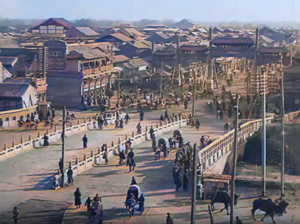
he history of modern China has been told from many perspectives. Historiography abounds in trends or notions to define the nature of China’s historical trajectory after the Opium Wars. From « China’s response to the West », to « modernisation », to "China-centered » to post-modern « hybridity » in Western historiography, from « Imperialist yoke » to « semi-feudal, semi capitalist » to the « century of national humiliation » in China, there is a broad spectrum of competing views that reflects the changing perspectives of Chinese and non-Chinese historians about how modern China was born. For almost two decades, the Chinese government has adopted the mantra of the « century of national humiliation » — a modern re-hash of the previous marxist criticism of imperialism —to promote a new sense of patriotism in the wake of the Tian’anmen movement in 1989 and to reinvent the narrative of the rise of the modern Chinese nation. For a long period, China as a country, as a state, was subject to treaties and dispositions that definitely encroached upon her sovereignty. By the 1930s, however, the Nationalist government had gotten rid of nearly all the restrictions on its sovereign rights. What remained was a few flakes of territory still under foreign administration (foreign settlements) and the legal privilege of extraterritoriality for foreign residents. Yet, foreign powers had already shifted gear to respond to the restoration of central power and the rise of a modern nation. The Chinese state, especially after 1927, made its strong arm felt tangibly, even in the foreign settlements. The Sino-Japanese war interrupted a process that was leading to the full recovery of China’s rights.
The focus on « national humiliations » and a treaty-based history actually misses the point. It is my contention that whatever the treaties, even in the immediate aftermath of the Opium wars, China was not just a « country », it was before all a society, a well-structured and organised society, a society endowed with a long history of statecraft, of craving for education, and resourcefulness in producing, trading, and consuming. In the mid-19th century, China as a country under severe tensions, mostly domestically, but the challenge of Western and Japanese intrusion and the string of military defeats undermined the confidence of the elites in the imperial state, but also more deeply in themselves. If we look at China from the angle of state relations, we will continue to see the conflicts, the defats, the unequal treatises, and the territorial concessions. But if we look at China from the angle of how its population, and of course the elites, rose to the challenge, we can see a very different picture. A picture in which scores of Chinese sought each and every opportunity to gain the knowledge, the skills, the resources available to them, in China and in foreign countries. Education was at the core of this movement. It was about acquiring the best available knowledge and make use of it to achieve their personal individual goals, but in many cases also with a sense of responsibility toward society and the country. It is clear that it was an unequal process — but no more unequal than it was before —and the members of elite families thrived in this new and unstable environment. Overall, however, missionary structure, scholarships, and initiatives like the work-study programs offered avenues for elite and many non-elite individuals to get the best training, to become not infrequently best among their peers, and to bring back that knowledge and build on it to educate even more people. From the mid-19th century to the mid-20th century, Chinese society transformed at a rate and a scale few countries have experimented. The Chinese elites underwent a complete overhaul that endowed the country with a massive pool of talents at the root of China’s success, then and now.
[1] William Kirby, “Engineering China: Birth of the Developmental State,” in Becoming Chinese: Passages to Modernity and Beyond, ed. Wen-hsin Yeh (Berkeley: University of California Press, 2000), 152–75; William Kirby, “Engineers and the State in Modern China,” in Prospects for the Professions in China, ed. Kenneth Winston, William P Alford, and William Kirby (London: Routledge, 2009), 283–313.